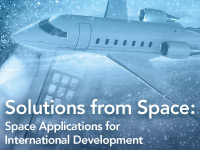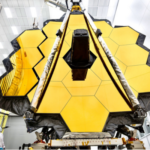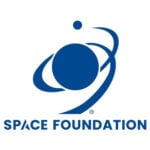Space Foundation Press Releases
Space Foundation Says Developing Nations Can Use Space Solutions for Earth-Bound Problems
Written by: developer
 COLORADO SPRINGS, Colo. (Sep. 17, 2009) — Some of the solutions to many developing nations’ social and economic woes might just come from the most unlikely place – outer space.
COLORADO SPRINGS, Colo. (Sep. 17, 2009) — Some of the solutions to many developing nations’ social and economic woes might just come from the most unlikely place – outer space.
The Colorado Springs-based Space Foundation said in a white paper released this week that the ability of space-based technology to overcome infrastructure and access issues might help solve previously insurmountable economic, public health, and standard of living issues for developing nations. Plus, the highly collaborative nature of space research, development, and deployment could speed the process along because developing nations could easily benefit from existing policies and resources developed and managed by wealthier and more advanced space-faring nations.
Solutions from Space: Space Applications for International Development, which can be downloaded free from the Space Foundation’s website (click here), emphasizes the importance of science and technology – particularly space technology – in addressing many of the serious social and economic challenges developing nations face.
Communications satellites, for example, can connect people in remote areas, provide medical expertise to areas where specialized personnel are not available, help students and teachers access educational content, and promote business and growth.
Remote sensing satellites can provide disease avoidance and food security information, inform policy-makers about changes in land use, facilitate timely natural disaster relief, monitor conflicts, and help identify where aid is needed most.
In addition, indigenous space activities can enable wide-reaching economic growth, allowing countries to break the cycle of poverty and international aid. Investing in space capabilities spurs progress in science and technology, develops educated citizens and technology-smart governments, and encourages high-tech industry to grow. Investing in space activities can help developing nations take control of their futures.
Solutions from Space: Space Applications for International Development contains a number of recommendations on how space technology can enhance developing nations’ science and technology capacity to stimulate economic growth, including:
- Space programs in developing nations should focus first on programs with direct benefit to society, keeping costs as low as possible and ensuring that the benefits are clearly communicated to the public.
- Space solutions should be culturally appropriate to ensure that they are more readily adapted and accepted.
- When creating national policies and regulations, developing nations should create logical regulatory schemes, provide clear guidance on how to work within existing regulations, and coordinate with the common principles and procedures among nations with existing space legislation.
- To reduce risk and costs, developing nations should consider international collaboration as a method for incremental space program development.
- Studies should be initiated – either by local governments or by companies interested in identifying new markets – to define the market for space-related solutions in developing nations, to provide understanding of the complexities and differences in various areas, and to suggest the best ways to proceed in introducing new technologies.
“The Space Foundation believes that developing nations will reap tremendous benefits by using space assets,” said Marty Hauser, Space Foundation vice president – Washington Operations, Research & Analysis. “There is a need to further develop and implement applications that directly address the challenges faced by these countries. The developed world can cooperatively support building indigenous science and technology capacity to help achieve this goal.”
According to the report, the number of developing nations beginning or expanding space activities is already growing, including India, Brazil, and Nigeria. It says that developed nations are also recognizing the value of applying space applications to the needs of developing nations: NASA provides satellite data and expertise to the Famine Early Warning System (FEWS) for developing nations; Africa and the European Union have a partnership with the African Union for Science, Information Society and Space; and the United Nations Program on Space Applications promotes practical uses of space technology in sustainable development.
“Commercial companies are involved as well,” said Hauser, noting that Intelsat, a major satellite communications company, supports projects using satellite-based models for improving education and health in Africa, and that a number of satellite companies, such as SES World Skies, offer communication services in developing areas. “These activities are having an impact.”
Solutions from Space: Space Applications for International Development goes on to say that developing nations do not need to invest significantly. Applications – such as famine prediction maps – created by countries with well-developed space programs or by international groups, such as the United Nations, may be provided to developing nations for little or no cost. But, the report says, there is additional benefit to creating indigenous programs, even as simple as a group of space experts who help the country understand how space assets can address national goals. “This understanding can guide national space policy, give the nation a voice in international efforts, and provide a starting point for identifying and cultivating strategic partnerships with nations with advanced space technology,” said Hauser.
To read Solutions from Space: Space Applications for International Development or download a copy, go to www.SpaceFoundation.org/research.
About the Space Foundation
The Space Foundation is an international, nonprofit organization and the foremost advocate for all sectors of the space industry – civil, commercial, and national security. Founded in 1983, the Space Foundation is a leader in space awareness activities, space-related educational programs, and industry events, all in support of its mission “to advance space-related endeavors to inspire, enable, and propel humanity.” An expert in all aspects of the global space industry, the Space Foundation publishes The Space Report 2009: The Authoritative Guide to Global Space Activity and provides three indices that track daily performance of the space industry. The Space Foundation will sponsor the Strategic Space Symposium with USSTRATCOM Nov. 2-4 in Omaha, Neb., and the 26th National Space Symposium in Colorado Springs, Colo., April 12-15, 2010. Headquartered in Colorado Springs, the Space Foundation conducts research and analysis and government affairs activities from its Washington, D.C., office and has field representatives in Houston, Texas, and Cape Canaveral, Fla. For more information, visit www.SpaceFoundation.org. Follow us on Twitter: SpaceFoundation.
# # #


